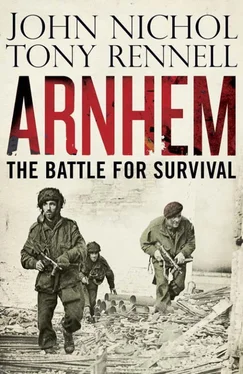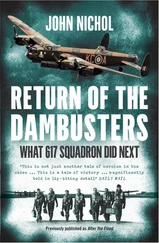The problem was that their words transforming failure into success rang hollow. Churchill exulted in ‘the largest airborne operation ever conceived or executed’ and how it had helped achieve ‘a further all-important forward bound in the north’. Except that it hadn’t. That ‘forward bound’ was into a cul-de-sac. Leaders and generals are apt to dismiss as ill informed or just plain wrong the views of the rank and file, deprived of the bigger picture. What would they know? But Leo Heaps, who fought at Arnhem and lost – and knew that he had lost because he endured months of imprisonment as a result – had no qualms in describing the Arnhem he experienced as ‘that disastrous hiccup in the liberation of Europe’. There is every reason to think he was right.
Yet, in the immediate aftermath, it was now the consensus view that capturing the bridge at Nijmegen had been the key objective of Market Garden and therefore the important contribution of the Airborne Division had been in keeping the Germans tied up at Arnhem and Oosterbeek while that bridge 10 miles south was secured. ‘Your losses have been very heavy,’ a seemingly sorrowful Horrocks wrote to Urquhart, ‘but in your fighting north of the Lower Rhine, you contained a large number of German reserves and prevented any reinforcements from moving down towards Nijmegen, [which] gave us time to secure those vital bridges.’ Browning wrote in similar vein. ‘Without the action of the 1st Airborne Division in tying up, pinning down and destroying in large numbers the German forces in the Arnhem area, the capture of the bridges at Nijmegen would have been quite impossible.’ It is hard, reading the correspondence and the speeches sixty-five years later, not to conclude that the military establishment was suffering from collective – and convenient – amnesia. Hadn’t Arnhem been the principal objective, so that the Second Army could make its dash to the Ruhr? That was certainly what those thousands of paratroopers and glider pilots holed up in Arnhem and Oosterbeek and waiting for the promised deliverance had believed, and it was why many had given their lives and even more their freedom. But in the aftermath, there seemed to be a total unwillingness to recognize that the Second Army had failed to deliver and, as a result, the brave men of Arnhem had been cut off behind enemy lines and sacrificed.
Arnhem was a defeat. There can be no doubt about that. And there were recriminations. The Allied high command, in need of a scapegoat, vented their exasperation on the Polish general, Sosabowski, for supposedly lacking zeal. His vociferous and justifiable complaints about the operation were used in evidence against him, and he was fired. Browning was exonerated of any blame but was never promoted again. Horrocks, though, went from strength to strength, untainted by any criticism. His XXX Corps finally reached the Rhine in March 1945 after a fierce and costly battle for the Reichswald forest, which would never have been necessary if the Arnhem ‘left hook’ into Germany had been pulled off six months earlier. As for Montgomery, his reputation took a huge knock, not least with the Americans, whom he disliked and who disliked him in return. In his memoirs, published fourteen years later, he admitted mistakes and ‘bitter disappointment’, but in such a way that, characteristically, he shifted the blame on to others. He put up a raft of excuses and explanations or, as he put it, ‘reasons why we did not gain complete success at Arnhem’. He blamed himself for not insisting that the drop zones were closer to the bridge – not as humble a mea culpa as it sounded, because everyone knew that this had been the RAF’s call, not his – but, otherwise, it was primarily Eisenhower who was at fault for being half-hearted and hedging his bets and under-equipping him with men and materials. And then there was the weather, which ‘turned against us after the first day. But weather is always an uncertain factor, in war and peace. This uncertainty we all accepted. It could only have been offset, and the operation made a certainty, by allotting additional resources to the project, so that it became an Allied and not merely a British project.’ In other words, if Montgomery was to be believed, even the problems created by the weather were down to the American supreme commander.
But in this defeat on the banks of the Lower Rhine, there was also victory for the Airborne at Arnhem, and a notable one at that. The courage of the men who fought it, who endured and who gave up only when ordered to, was a magnificent triumph of the spirit. A reporter welcoming some of the exhausted men back listened to their stories of ceaseless enemy attacks with flame-throwers, tanks and self-propelled guns firing high-explosive and armour-piercing shells, but what truly amazed him was when they added: ‘When can we go back? We have to go back to get the rest of our chaps out.’ [6] The Times , 28 September 1944.
He concluded rightly that ‘they were beaten in body but not in spirit.’ A para sergeant-major spoke for the entire division when he wrote – in an anonymous memoir entitled simply ‘I was there’ [7] Lodged at Airborne Assault, Imperial War Museum, Duxford.
– that ‘I am proud to have fought at the Battle of Arnhem, not just to have been there but to have been side by side with men of courage and determination, so many of whom did not come back.’
Lieutenant Bruce Davis was an American airman who went on the Arnhem mission as a ground observer, tasked to scout locations for a US air force signals operation behind the German lines. Instead he was caught up in the fighting. American servicemen did not always rate their British allies, but his report when he got home was an extraordinary encomium. ‘Courage was commonplace and heroism was the rule not the exception,’ he wrote, not about himself – because ‘I was badly scared a great deal of the time’ – but about the British companions he found himself fighting next to. ‘I saw men who were hungry, exhausted, hopelessly outnumbered, men who by all the rules of war could have gladly surrendered and had it all over with, men who were shelled until they should have been hopeless psychopaths, and through it all they laughed, sang and died, and kept fighting because they were told this battle would shorten the war. They absorbed everything – mortars, tanks, S-P guns, machine guns – everything in the book, and kept coming up for more. The German infantry was scared of the Red Berets and would not attack without the help of armour or big guns. There was constant evidence that they gave Jerry the fright of his life. And the amazing thing about the British was that they carried on with the light-hearted abandon of a Sunday-school class on their first spring picnic. What I learned from the Arnhem operation was that men born and bred as free men have a great strength and willpower, which they never suspect until they need it.’ [8] Airborne Assault, Imperial War Museum, Duxford.
A good number of those brave men were still having to call on their reserves of strength and willpower. Not everyone had escaped across the river or gone into captivity. There were an unknown number of airborne men on the loose and in hiding in that German-held area of woods, heaths and farmland north of the Lower Rhine. This was the postscript to the Battle of Arnhem: the continuing fight to survive and stay free long after it was over. They would trickle back to their own lines over the next weeks, some individually, others in groups organized by the Dutch Resistance. Some would lie low, protected by brave local families but in constant danger of discovery or betrayal, for more than six months, and not get home until the Netherlands was finally liberated and the war was very nearly over. The hundreds who made their way home in the months after Arnhem knew that they owed their survival and their salvation to the Dutch. Glider pilot Alan Kettley not only escaped – first from a moving train heading into Germany and then across the Waal to his own lines – he also went back on undercover missions to help others to come out. But he felt his bravery was eclipsed by the courage of the Dutch underground movement. ‘If any of us had been captured, it was a POW camp. But for the Dutch it meant they and their families would be shot and their houses burnt down. The Dutch resistance, the Dutch civilians, were the real heroes.’
Читать дальше












